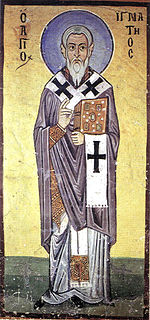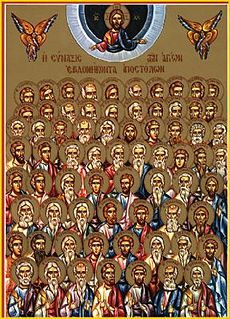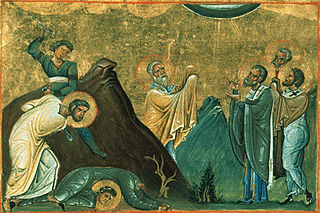
Ignatius of Antioch, also known as Ignatius Theophorus, was an early Christian writer and Patriarch of Antioch. While en route to Rome, where he met his martyrdom, Ignatius wrote a series of letters. This correspondence now forms a central part of a later collection of works known to be authored by the Apostolic Fathers. He is considered to be one of the three most important of these, together with Clement of Rome and Polycarp. His letters also serve as an example of early Christian theology. Important topics they address include ecclesiology, the sacraments, and the role of bishops.

Antioch on the Orontes was a Hellenistic city on the eastern side of the Orontes River. Its ruins lie near the current city of Antakya, Turkey, to which the ancient city lends its name.
Theophilus is a male given name with a range of alternative spellings. Its origin is the Greek word Θεόφιλος from θεός (God) and φιλία can be translated as "Love of God" or "Friend of God", i.e., it is a theophoric name, synonymous with the name Amadeus which originates from Latin, Gottlieb in German and Bogomil in Slavic. Theophilus may refer to:
Ignatius is a male given name of presumed Latin or Etruscan origin.
Saint Elias, the Latin form of the Hebrew name Elijah, may refer to any of:
Macarius is a Latinized form of the old Greek given name Makários (Μακάριος), meaning "happy, fortunate, blessed"; confer the Latin beatus and felix. Ancient Greeks applied the epithet Makarios to the gods.
Eudoxia, Eudokia or Evdokia is a feminine given name, which originally meant "good fame or judgement" or "she whose fame or judgement is good" in Greek. The Slavic forms of the name are East Slavic: Evdokiya, Yevdokiya ; South Slavic: Evdokija (Евдокија), Jevdokija (Јевдокија). It was mainly popular in late antiquity and during the Middle Ages, particularly in Eastern Europe. It continues to be in use today, usually in honor of various saints.

The Melkite Greek Catholic Church or Melkite Byzantine Catholic Church, is an Eastern Catholic church in full communion with the Holy See as part of the worldwide Catholic Church. Its chief pastor is Patriarch Youssef Absi, headquartered at the Cathedral of Our Lady of the Dormition, Damascus, Syria. The Melkites, Byzantine Rite Catholics, trace their history to the early Christians of Antioch, formerly part of Syria and now in Turkey, of the 1st century AD, where Christianity was introduced by Saint Peter.

The seventy disciples or seventy-two disciples, known in the Eastern Christian traditions as the seventy apostles or seventy-twoapostles, were early emissaries of Jesus mentioned in the Gospel of Luke. The correct Greek terminology is evdomikonta (εβδομήκοντα) apostoli or evdomikonta mathetes.
Asclepiades is the name of:
Eustathius or Eustathios is a Greek masculine given name, in English rendered Eustace. It may refer to:

Quartus was an early Christian who is mentioned in the Bible.
Saint Pelagia, Pelagia of Antioch, Pelagia the Penitent or Pelagia the Harlot was a legendary Christian saint and hermit in the 4th or 5th century.
Serapion is a given name, a variant of Seraphin.
Athanasios, also transliterated as Athnasious, Athanase or Atanacio, is a Greek male name which means "immortal". In modern Greek everyday use, it is commonly shortened to Thanasis (Θανάσης), Thanos (Θάνος), Sakis (Σάκης), Nasos (Νάσος), Athan (Αθαν) or Athos (Aθως).

Herodion of Patras was a relative of Saint Paul whom Paul greets in Romans 16:11. According to tradition, he was numbered among the Seventy Disciples and became bishop of Patras, where he suffered greatly. After beating, stoning, and stabbing him, they left him for dead, but St. Herodion arose and continued to serve the Apostles.
Phlegon of Marathon is numbered among the Seventy Disciples. He was bishop of Marathon in Thrace. He is referenced in Romans 16:14, and his feast day is on April 8.

Saint Peter, also known as Peter the Apostle, Peter the Rock, Simon Peter, Simeon, Simon, or Cephas, was one of the Twelve Apostles of Jesus Christ, and one of the first leaders of the early Church. He is traditionally counted as the first bishop of Rome—or pope—and also as the first bishop of Antioch. Based on contemporary historical data, his papacy is estimated to have spanned from AD 30 to his death, which would make him the longest-reigning pope, at anywhere from 34 to 38 years; however, the length of his reign has never been verified.
Gerasimos is a Greek given name derived from Greek "γέρας". The suffix -ιμος gives the meaning "the one who deserves honour". It can also be anglicized as "Gerassimos" or "Gerasimus". It can also be slavicized as Gerasim.






